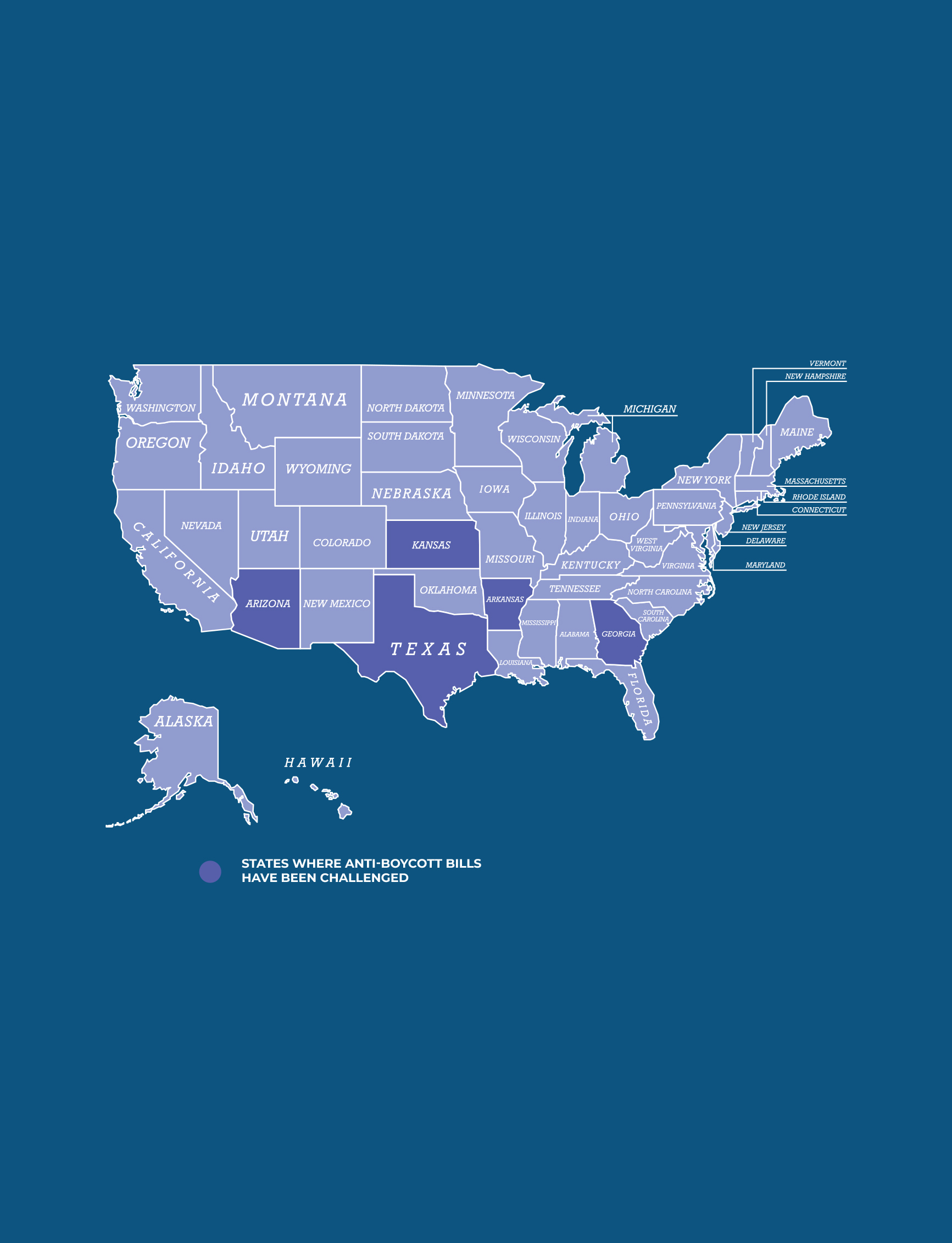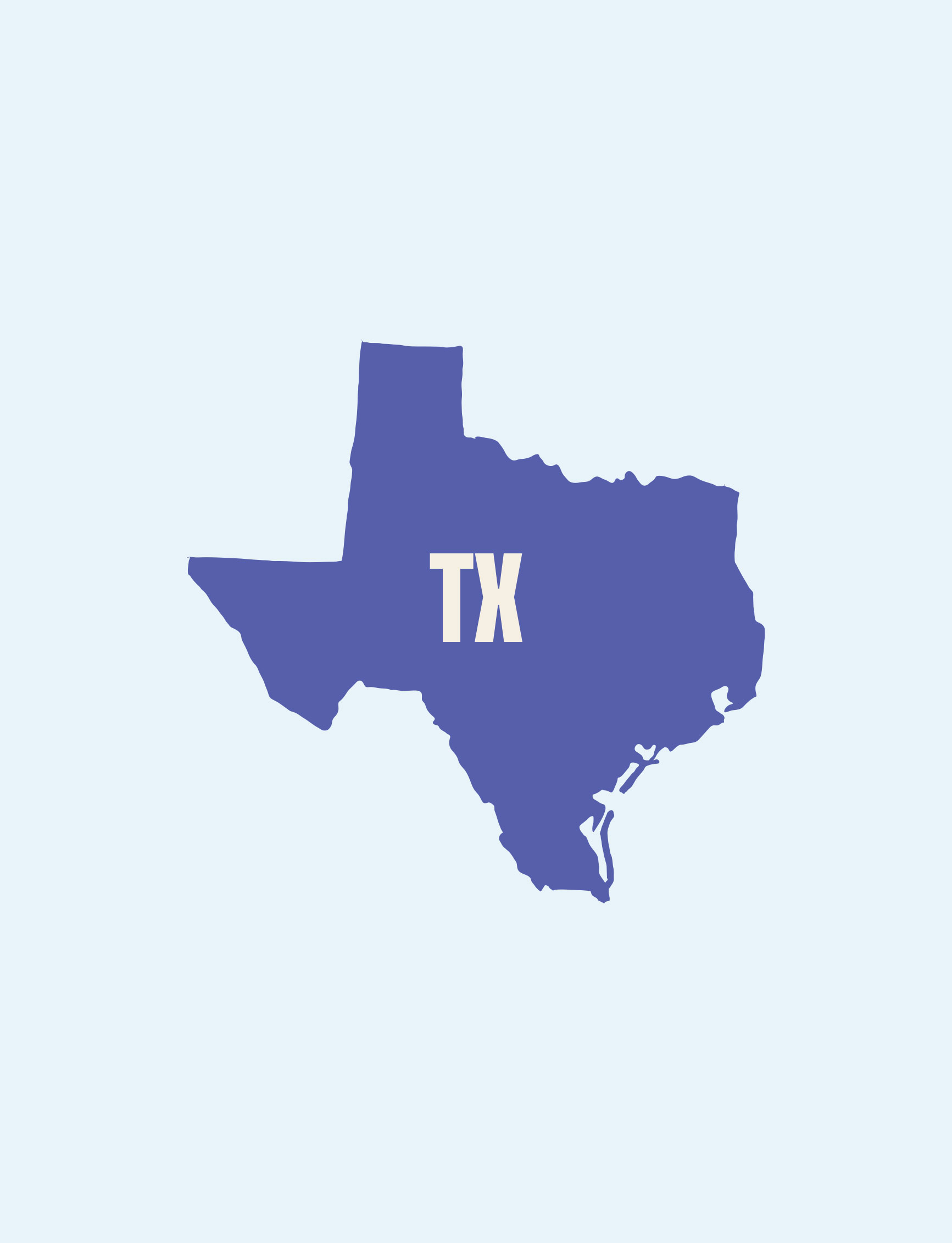
Explore
Timeline of Legal Opposition to Anti-Boycott Laws

-
Koontz v. Watson
- October 2017
Esther Koontz challenges Kansas’s anti-boycott law in court.
-
January 2018
A federal district court rules in Esther’s favor, finding that the law violates her First Amendment rights.
-
April 2018
Kansas lawmakers amend the law, rendering Esther’s case moot, but leaving the underlying constitutional issues unresolved. The new certification excludes sole proprietorships, companies employing five or fewer employees, and companies with contracts valued at less than $100,000.

Jordahl v. Brnovich
- December 2017
Mikkel Jordahl challenges Arizona’s anti-boycott law in court.
- September 2018
A federal district court rules in Mik’s favor, finding that the law violates his First Amendment rights.
- April 2018
Arizona lawmakers amend the law, rendering Mik’s case moot, but leaving the underlying constitutional issues unresolved. The amended law pertains only to businesses with 10 or more full-time employees with contracts valued at $100,000 or more.

American Muslims for Palestine v. Arizona State University
-
March 2018
American Muslims for Palestine (AMP) and Dr. Hatem Bazian challenge Arizona’s anti-boycott law in court.
-
March 2018
In a court-approved agreement, Arizona State University modifies its speaking engagement contract with Dr. Bazian and AMP so they are no longer required to sign the certification. Arizona’s anti-boycott law, however, remains in place.

Amawi v. Pflugerville Independent School District and Pluecker v. Paxton
-
December 2018
Bahia Amawi challenges Texas’ anti-boycott law in court. In a separate lawsuit, John Pluecker, George Hale, Obinna Dennar, and Zachary Abdelhadi challenge the same Texas law. Their cases are later consolidated.
-
April 2019
A federal district court sides with the plaintiffs, arguing that the laws violate their First Amendment rights.
-
May 2019
Texas lawmakers amend the law, rendering the plaintiffs’ case moot but leaving the underlying constitutional issues unresolved. The amended law pertains only to businesses with 10 or more full-time employees with contracts valued at $100,000 or more.

A & R Engineering and Testing v. Houston
-
October 2021
A&R Engineering and Testing, Inc. is the first company with a contract valued over $100,000 to challenge Texas’ revised Israel anti-boycott law in court.
-
January 2022
The district court rules in the company’s favor but applies its ruling narrowly to apply only to A&R Engineering, stopping short of striking down the law. Texas appealed the decision to the Fifth Circuit Court of Appeals.
-
July 2023
The Fifth Circuit vacates the injunction against the anti-boycott law on procedural grounds but does not rule on the merit of the case or the constitutionality of the law.

Arkansas Times LP v. Waldrip
-
December 2018
Alan Leveritt challenges Arkansas’s anti-boycott law in court.
-
January 2019
The federal district court dismisses the case, upholding the state’s law.
-
February 2021
A three-judge panel of the Eighth Circuit Court of Appeals reverses the lower court’s decision, finding the law unconstitutional.
-
June 2022
After appeal, a full panel of the Eighth Circuit Court of Appeals rules in favor of the state, upholding the anti-boycott law. They are the first federal court to rule that anti-boycott laws are constitutional.
-
February 2023
The Supreme Court, after the ACLU appeals the Eight Circuit’s ruling, announces it will not hear Alan’s case.

Ali v. Hogan
-
January 2019
Saqib Ali challenges Maryland’s anti-boycott Executive Order in court.
-
October 2020
A federal judge dismisses the case after finding that Ali did not have standing to challenge the Executive Order as he had not been awarded a state contract.
-
February 2022
The Fourth Circuit Court of Appeals upheld the dismissal after Ali appealed.

Martin v. Wrigley
-
February 2020
Abby Martin challenges Georgia’s anti-boycott law in court.
-
May 2021
A federal judge denies the State’s motion to dismiss the case, finding the law violates Martin’s First Amendment rights.
-
February 2022
Georgia lawmakers amend the law, rendering Martin’s case moot, but leaving the underlying constitutional issues unresolved. The new certification excludes sole proprietorships, companies employing five or fewer employees, and companies with contracts valued at less than $100,000. When rendering Martin’s case moot, the court also declined to hold state officials liable for the harm already done to Martin under the doctrine of qualified immunity.
-
November 2022
Martin files an appeal with the 11th Circuit Court of Appeals.
-
June 2023
The Eleventh Circuit Court of Appeals affirms the lower court’s ruling but does not rule on the constitutionality of the law.